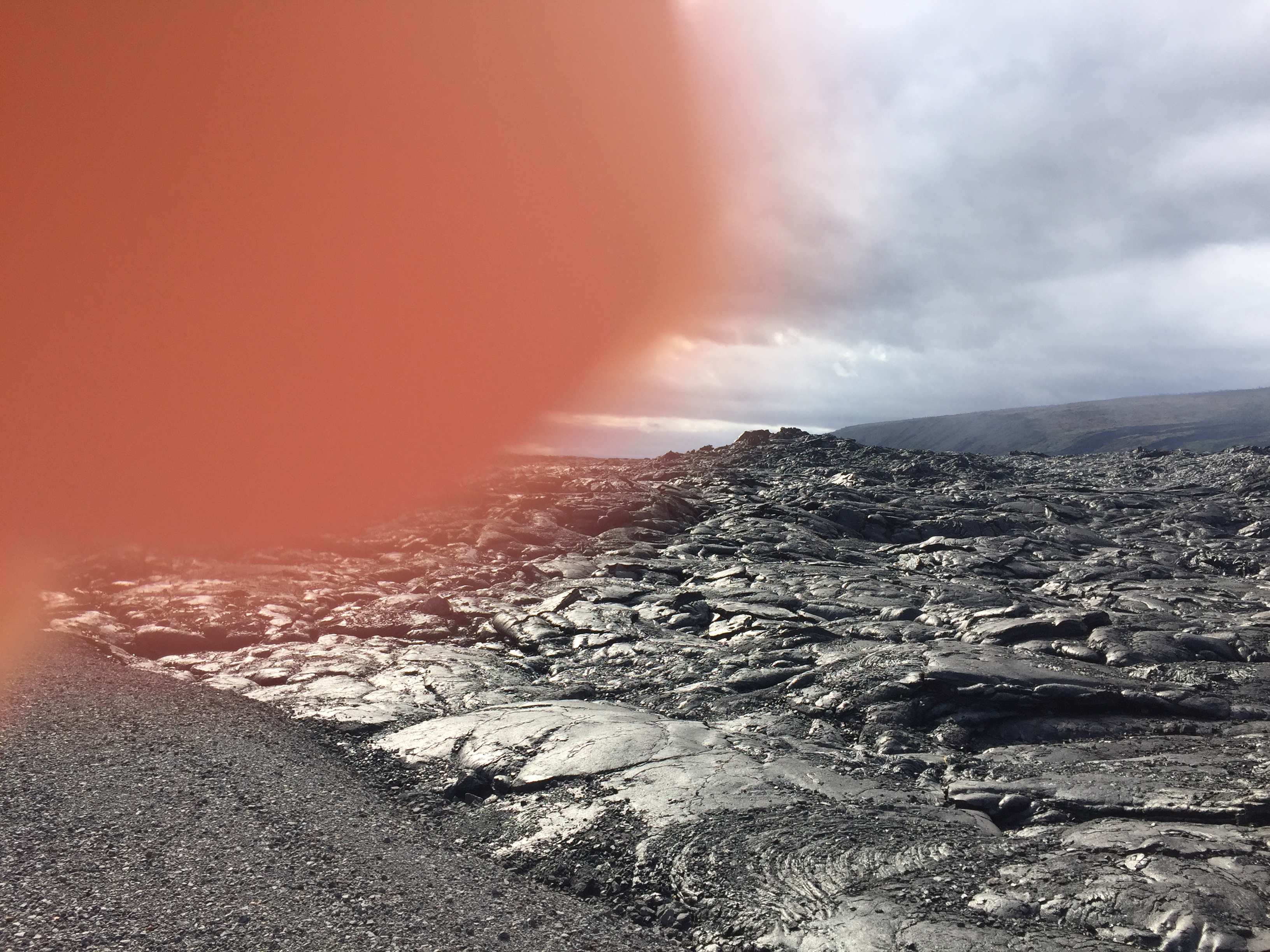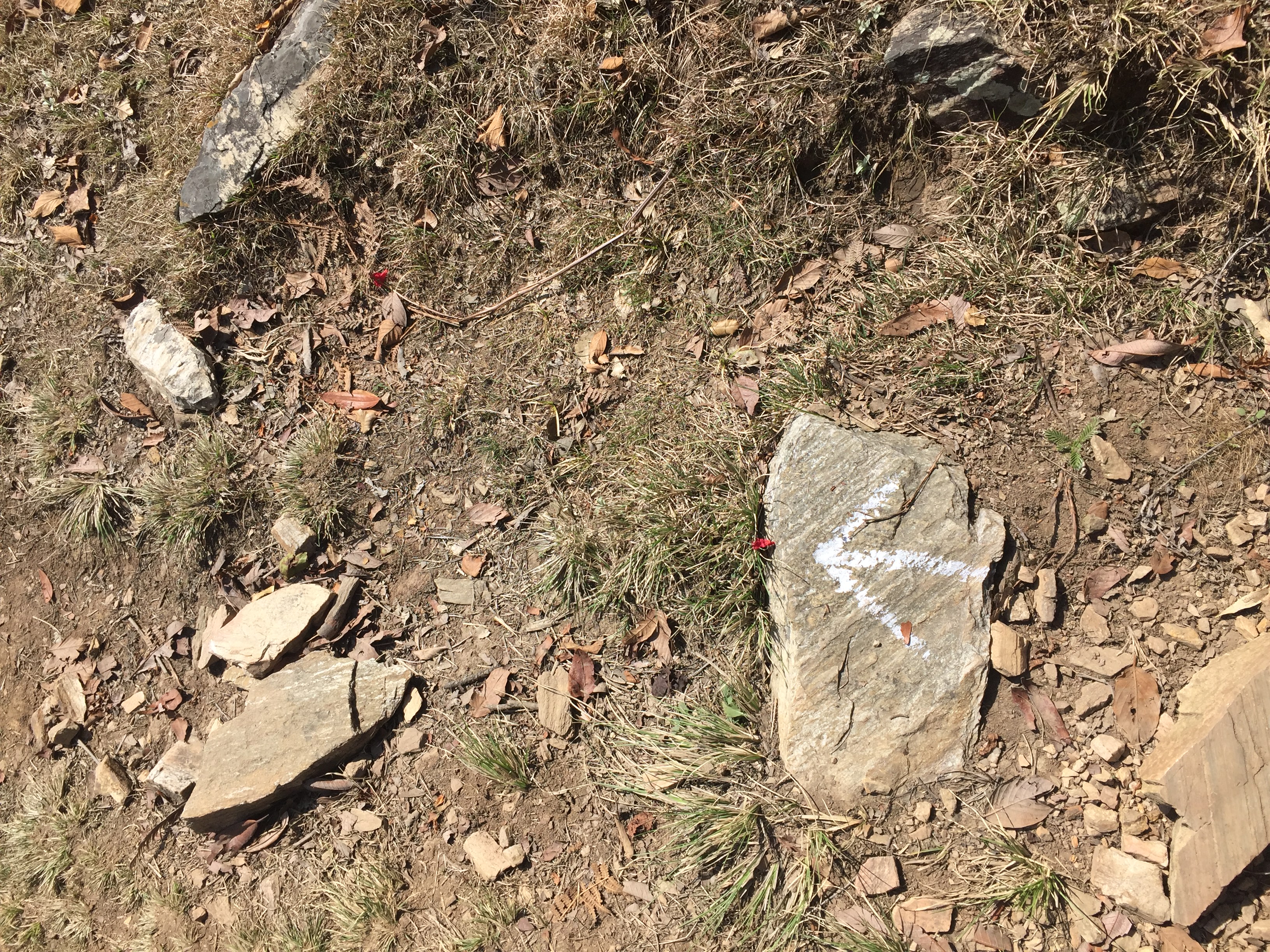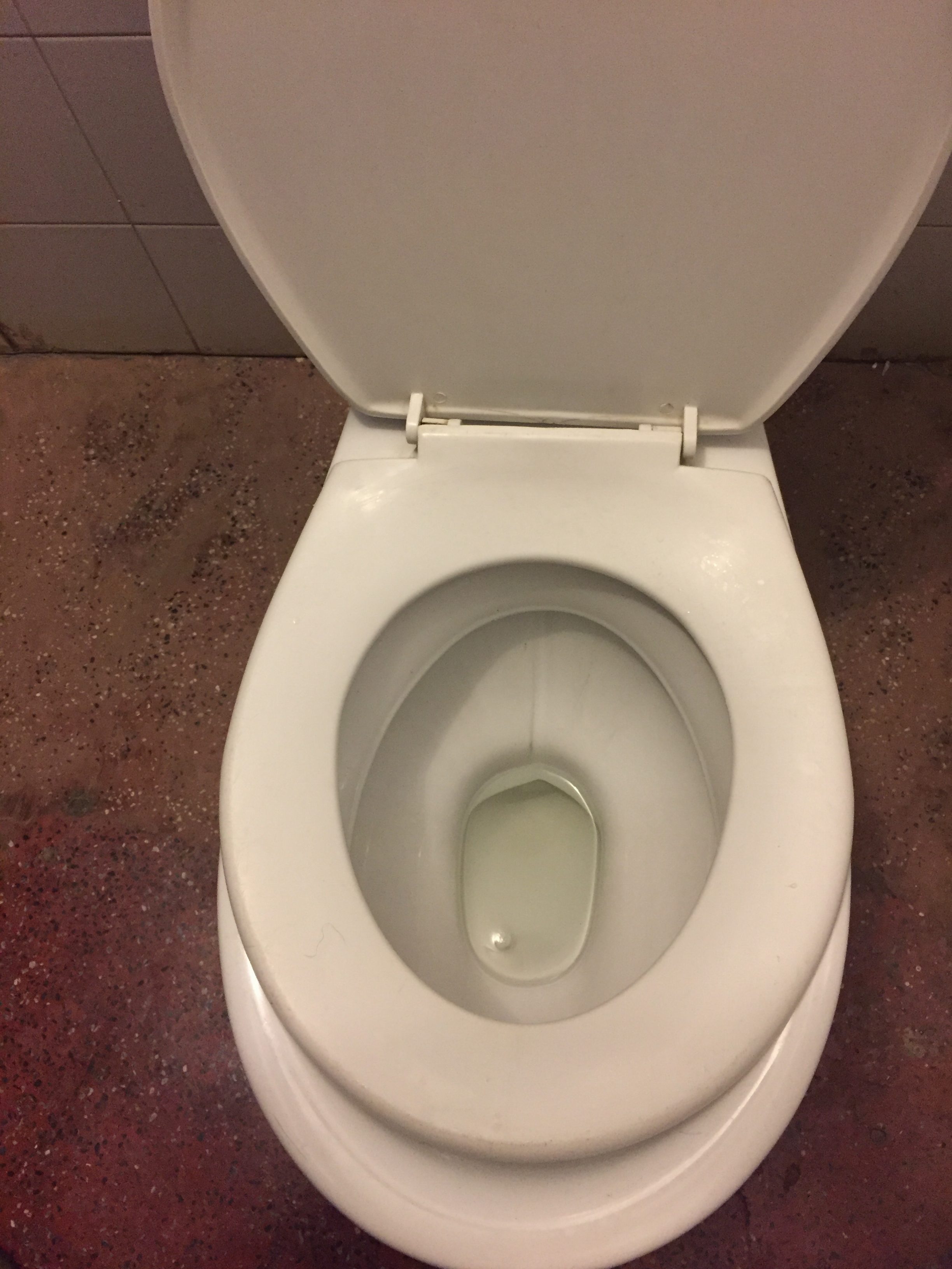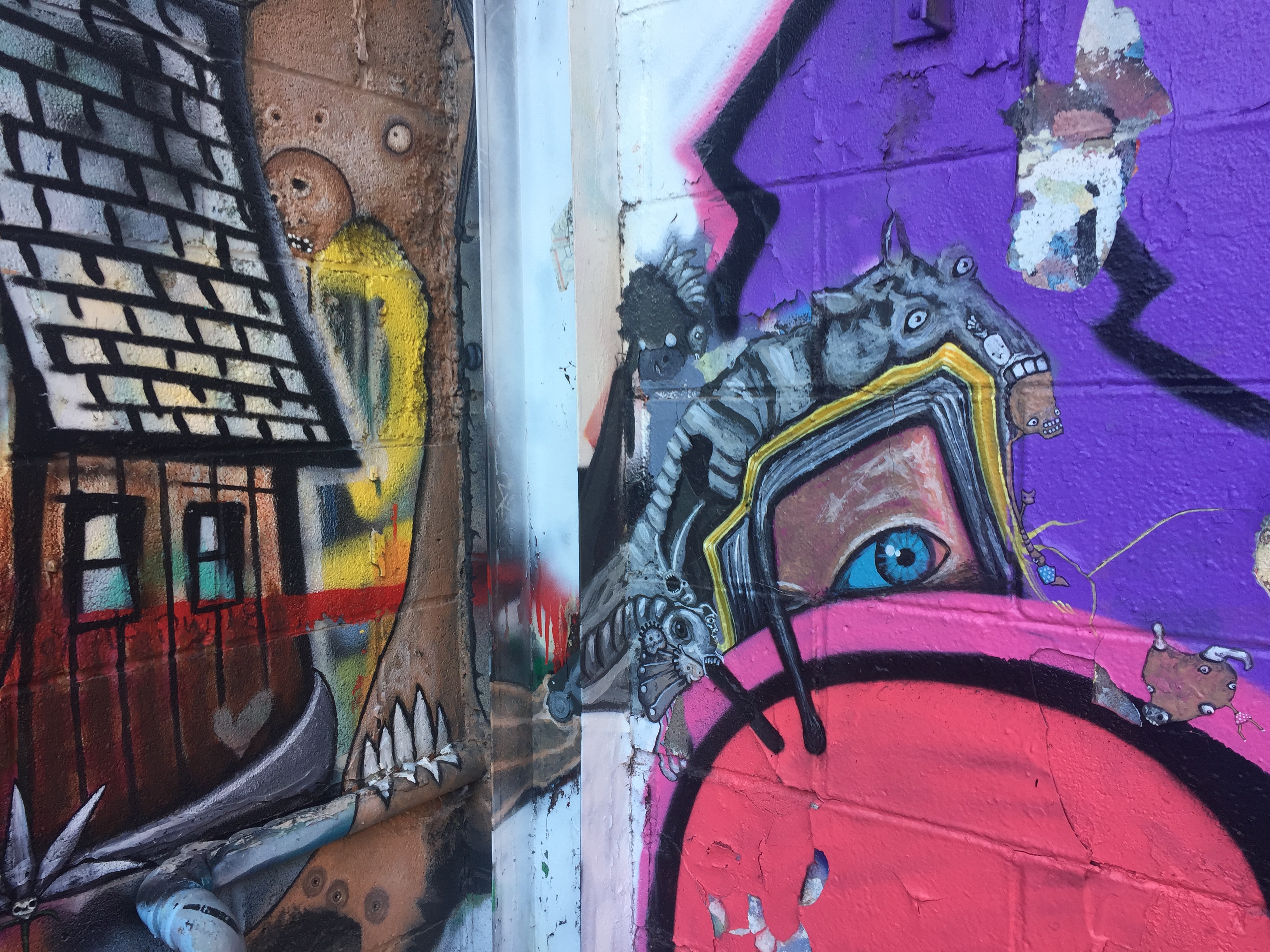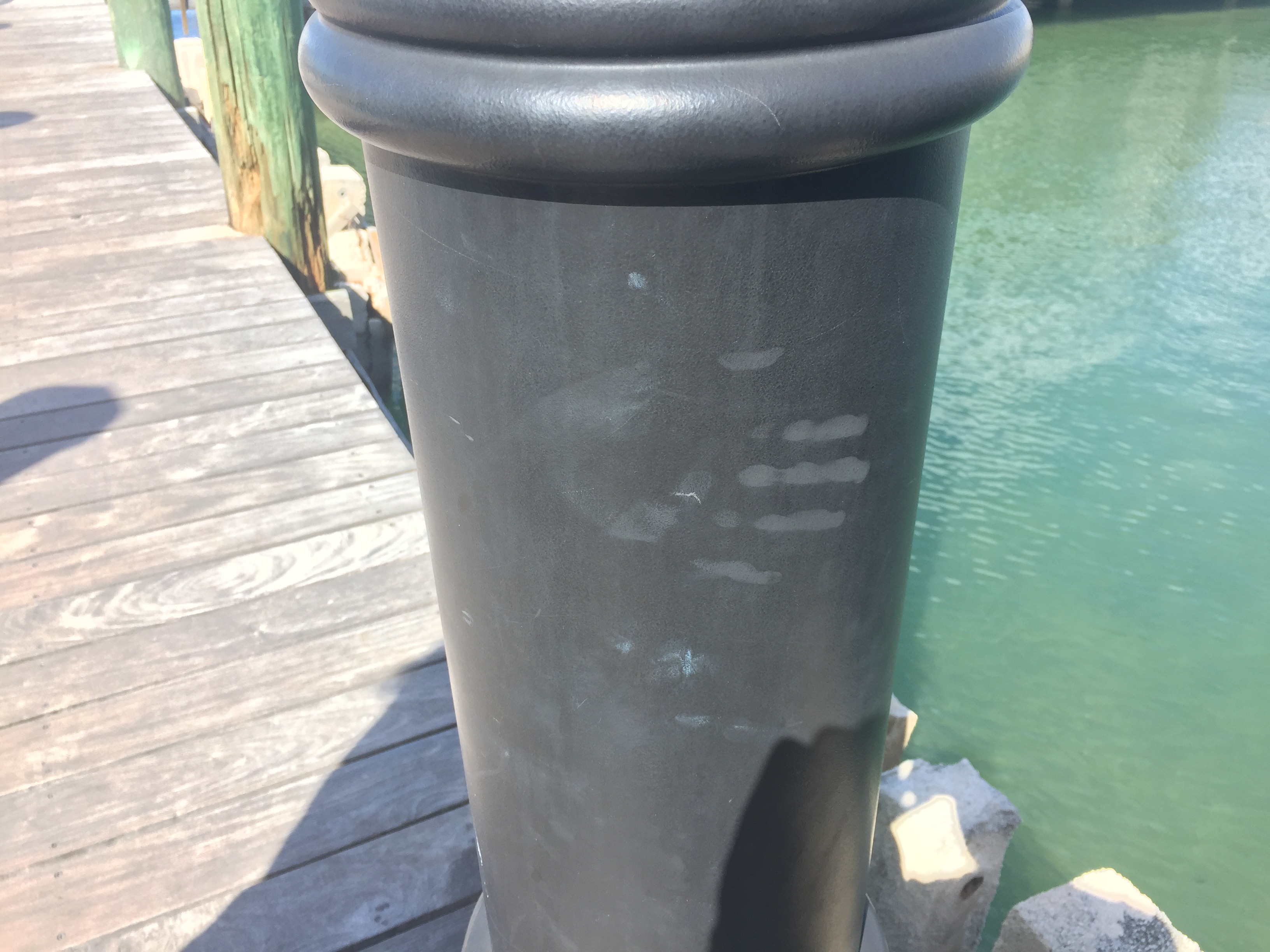
It must have been a relief to realize that, in creating a ‘Museum of Glass,’ the gift shop would basically build itself. Shot glasses? Sun glasses? Snow globes in a region that rarely sees snow? As long as there is glass involved, why not a little bit of everything?
Like most privately-owned, roadside museums, the ‘Museum of Glass’ leads with its gift shop. It’s where you buy the entry ticket or, realizing the inside of the museum is not air-conditioned, it’s where you use the restroom and then leave guiltily without buying anything at all. It’s easy to make ‘thank you’ sound like an apology. It must happen all the time here- the woman behind the counter seems surprised that anyone is willing to hand over $15 for a ticket.
“Lucky,” she says, “We’re having a two-for-one promotion.”
I look behind me and startle to see the stranger there, very close.
“Lucky,” he smiles.
‘The ‘Museum of Glass’ starts off well enough with a table-sized glass case, empty except for a paper sign that says, ‘THIS IS IT.’ An optimist assumes it is referring, humorously, to the case as a sample of the museum’s focus, but it is potentially also referring to the entire lower level of the collection which consists only of empty glass boxes and the same sign: ‘THIS IS IT.’
The rest of the building is much the same.
The ‘Museum of Glass’ is confusing and uninformative, which makes it a rather poor museum overall. It is soothing to the mind and the wallet to assume its true purpose is art or some massive, subtle joke you might pretend to understand later on, a joke about society and not about you. It does not advertise and appears on no maps. It does not sell postcards.’
We don’t speak again until we leave the gift shop and stand over the first case. Our reflections in the glass are vague and ghastly.
‘THIS IS IT.’
“Your phone has been disconnected.”
“I have a new phone,” he says, “I can give you that number.”
“What happened to the old one?”
“It got weighty.”
“You seem like a strong guy.”
The stranger breathes heavily and moves on to the next exhibit. It is a smaller glass box, its edges etched in a floral pattern.
‘THIS IS IT.’
“You keep a phone too long and people know where to find you,” he explains.
“That’s absolutely the point.”
“Even you weighed it down,” he says, “I don’t want to be found all the time.”
“You think I do?”
“Want to be found? By me? Yes.”
The next exhibit is a smaller glass box, laced with thin wire like a fire door.
‘THIS IS IT.’
“What have you figured out about this that I haven’t?”
“The most important thing,” he says, “Is to step with purpose.”
“That’s code for starting fires?”
“That’s the most obvious thing I do.”
“This all has to do with the path?”
The stranger sneezes and startles me. He rubs his nose apologetically and then drags his finger across the dusty case. He writes something:
‘THIS IS IT.’
“Imagine a path,” he says as we walk up the stairs to the second floor, “From one place to another. If the people on the path walk at the same speed and in the same direction…”
“I already know this,” I tell him, “They will never meet. But you’re not walking the same direction.”
“I am,” he says, “Sometimes.”
“So?”
“So, imagine a path that was made and is maintained only by those that walk it. Somebody began walking, somebody followed, and they memorize the way. The path has entered the first stage of existence- it exists in their heads.”
The second floor of the ‘Museum of Glass’ is startlingly different. Displays hold a mad assortment of glass shards, varied in shape, size, and color. The floor is also covered in glass, tiled to appear loose. They look like pieces of broken glass you might find on the street- the casual observer would be hard pressed to come to any other conclusion.
“This place is a garbage pile,” the stranger says, and he licks the gaps between his teeth.
The tiling on the floor is patterned into words:
‘THIS IS IT.’
“So, what happens to the path?” I ask.
“Eventually it enters the second stage of existence: it’s worn into the ground. At that point, anybody can follow it, though they may not know where it starts and where it goes,” the stranger’s reflection stares up at me from the broken glass display, “When we come upon a path we can be assured of two things- it’s either convenient or important, and it is, or was, used often. It becomes separate from the people who maintain it, but still indicative of their activities.”
“What does that have to do with Shitholes?”
“If there is a wider, more abstract path that we’re following,” he says, “Autumn by the Wayside intersects it constantly. It might be a map of the path itself. I don’t know, yet.”
“But you wrote it.”
For the first time since I’ve know the man, the stranger looks surprised. He frowns and rubs his nose.
“What?”
“You wrote the book,” I tell him, pulling out the vandalized copy of Shitholes, “This is you.”
He looks at it briefly and his frown deepens.
“That’s not me,” he says, “Why would you think I wrote that?”
The stranger’s mannerisms become anxious. He leans, as though to spit, but realizes he is inside. He reaches out to the rows of glass and fingers one of the points. A speaker crackles to life.
“Sir,” the woman downstairs says over the intercom, “Sir, please don’t touch the exhibits.”
He withdraws his hand.
“Why would you think I wrote that?” he asks again.
“What does the picture look like inside your copy?”
“The cover fell off years ago. Why would you think…?”
“I’ve gotten close to the author,” I tell him, “And everybody who’s seen him describes you.”
“I’ve never heard that,” he says, “And I’ve been doing this for…”
“Why do you start fires?” I ask him, “Why wouldn’t you write the book?”
“It’s dangerous,” he says, “A path like this can maintain itself until a tree falls across it or a landslide obscures the way. Controlled burning… clears the way a little.”
“And the book?”
“I wouldn’t write the book because I couldn’t have,” he says, turning back toward the stairs, “The book was there before I began. I’m going to use the toilet downstairs.”
“You’re going to disappear.”
“Yes.”
“Can I have your new number?”
The stranger does not stop, but he says:
“I still have yours.”
The third floor of the ‘Museum of Glass’ is all windows- it’s sweltering in the midday sun. Somebody has carefully places stones in the field behind the building. They form the words:
‘THIS IS IT.’
The stranger’s car rattles down the highway and, eventually, out of sight.
I walk back down to the gift shop and pretend to browse the shelves one last time. I turn to go and slip a dollar into an empty donation box at the door.
“Sir,” the woman says, “Please don’t touch the exhibits.”
-traveler
‘The man will remember me, reader.
The owner of ‘Eats’ is a man that claims to know a great deal, and it is men like this, men who are so caught up in knowing, that they aren’t much aware of the day-to-day details. They forget the names of their drivers, of distant, poorer relations. They forget employee birthdays- not individual birthdays (though they forget those too) but employee birthdays as a concept. They resent being reminded.
Of anything.
Their knowledge becomes a wall between themselves and the world. They carry the wall and speak through it and eventually forget that the voices on the other side are people like them.
It was my intention to include an interview with the owner of ‘Eats’ in this guide but the situation went awry. Suffice to say, the man will remember me.’
It has been a good long time since I have experienced the sort of nervousness that stretches several days, looming like a dark cloud over the landscape of my life. I have been plenty scared- I have been terrified- but terror leaves the body quickly and often with a great rush of relief. Terror gets me out of trouble. Nervousness hangs on me like shackles; it leaves me raw underneath.
It serves no purpose.
I am always nervous when I speak to someone who embodies an approximation of the zeitgeist. It seems, to me, a dangerous thing to align one’s beliefs too enthusiastically with those of the present. Beyond dangerous, it is blindly empowering. A train powers across the earth by the virtue of relying on tracks. It does not need to concern itself with steering, only with how quickly it is moving forward. The nature of a train is such that it will not be able to stop for something laid across the tracks, that leaving the tracks unexpectedly will be necessarily violent and damaging. The nature of the zeitgeist is the same.
I take the author at his word, that the owner of ‘Eats’ will remember something about their run-in, and I decide to continue in his footsteps. The owner’s house is well known about town. Not infamous, exactly, but enough of a local landmark that I don’t seem too suspicious asking. I drive by once before giving the man a call- a real gaudy place, not what I expected at all. A lot of purple paint. A seasonally appropriate flag waving just under the stars and stripes. Looks like Father’s Day is coming up. Who knew?
I call the house and explain I am writing a travel book. I tell the owner, Richard Jones, that I’m writing a travel guide and wanted to feature ‘Eats.’ I tell him it will only take a minute or two.
And he cheerfully agrees.
He doesn’t even ask my name.
I am nervous, reader, and I park my bike several blocks away so that I can build up the nerve to reach the door. I am nervous as I step under the man’s flags, flapping noisily. I hesitate on the stoop but eventually bring my hand to the bell. It rings cheerfully behind the curtained windows.
I wait, nervously.
The warning sound of a patrol car’s siren stops me from ringing it again a moment later. It has appeared in the street like a blue ghost, attentive and unmoving. I turn around and look both ways down the block and then back at the car. Sunlight on the windows obscures the officers inside. I can’t tell, at first, if I’m the suspicious one here.
When I reach for the doorbell again, the siren whoops and the passenger door of the patrol car swings open. A man steps out, an unsmiling police officer. He does not expect that I will run.
And I do.
Terror sends me fleeing through the neighborhood as it has led me through forests, fields, and highways before. I run without looking back and, somehow, manage to escape. I nervously return for my bike some time later and, some time after that, I do a little more research.
Turns out I was visiting Richard’s new place- the one before it burned down a couple years back in an act of arson. The suspect, a man that spoke to Richard shortly before the fire, was not found. The papers published a police sketch, though, and looking at it is like looking into a mirror.
-traveler
What is it that a drive-in burger place is trying to accomplish by existing between the standard restaurant form and the drive-thru? Is it so much more comfortable to eat in one’s car than it is to eat in the privacy of one’s home or in a restaurant, a venue designed for eating in? I doubt it, but then, I’m eating on the seat of my motorcycle and the weather has turned chilly again.
An early fall for this part of the country.
‘The drive-in, known only as ‘Eats,’ floats in the distant, unnamed suburbs of Bay Minette. It claims to be open 24 hours a day but this has not been true for some time and the high school age employees do not appreciate being quizzed about the discrepancy. They seem to appreciate very little.
‘Eats’ claims to have pioneered the toy-with-your-meal model of children’s fast food long before larger, more successful chains perfected the approach with the accidental (and nearly fatal) inclusion of three marbles in a child’s burger patty in 1975. An ill-received campaign following the incident featured children coughing up other small toys after taking a bite of their ‘Mini-Eat,’ much to their, and their parent’s, delight. Several branches were forced to close but the flagship store remains a cult favorite.
Because popular IP’s and reliable manufacturing services are beyond the scope of ‘Eats’ budget, their toys are designed and introduced solely based on the whims of the owner. Age has made him cynical and he makes the toys in kind.’
Leaves scrape across the ground and pile up underneath the motorcycle’s wheels. Brown and gold and red, like the colors of a midwestern high school.
Two places to my right is a group of black-teed teens, listening to an old punk song I think I remember and eating their burgers. Two places to the left is a family in an SUV. One of the children hangs out of the window, bored and hungry. The older brother laughs and tries to pull the runaway back in by its pants. The child kicks and laughs and eventually disappears back into the vehicle, leaving a trail of dust and saliva on the door.
Their father taps absentmindedly on the dash. I realize, after several minutes, that he is tapping in sync with the punk song. It doesn’t seem like he should be able to hear it from all that way over there. An unrelated mystery.
I turn my attention back to the teens when he catches my eye. With their windows closed, they might as well be in a different world. I find myself tapping as well, tapping and searching for a comfortable way to sit on my parked bike while I wait for my food.
The nucleus of ‘Eats’ is a roundish building with no windows and just two doors, only one of which ever seems to open. The name of the restaurant is spelled out in faded shingles across the roof- a large, practical font that could likely be read from the highway before the neighborhood grew too high around it. The color scheme is dated: brown, gold, and red like the leaves. ‘Eats’ is not a place that is trying to be retro; it is a building that never left the era that bore it.
When I ordered a children’s meal they asked me whether it was for a boy or a girl; a question that is, no doubt, destined for retirement soon. With little to sway me one way or the other, I went with my gut choice: girl. Why not?
There is a squeal from the SUV as a young man approaches with a heavy tray. It’s made to hang from the door but the woman in the passenger seats waves it away- wouldn’t want to scratch the paint. The food disappears inside before I get much of a look at it, but a few minutes later I catch glimpses of some sort of toy solider, puppeted about the window in the hand of the youngest.
My food arrives shortly. The waiter looks briefly between my bike and the tray.
“I don’t think it attaches to motorcycles,” he says.
“I didn’t expect it would.”
“You had one girl’s Mini-Eat?” he asks.
“That’s right.”
He hands me a bag and turns to go as I open it. Inside is a broken soldier.
“The toy…” I begin.
“It’s supposed to be like that,” he answers before I can finish, “It’s a wounded soldier.”
“This is the girl’s toy?”
The young man turns back to face me, clearly uncomfortable but practiced in this sort of situation.
“The boys get a whole soldier to encourage patriotism. The owner wants…” he sighs, “The owner wants young women to be prepared for taking care of them once they’re back.”
A greasy slip of paper in my hand suggests that the soldier’s stump leg can be dipped in ketchup for added effect. I fold it thoughtfully between my fingers.
“That’s fucked up,” I tell him, “On a lot of levels that’s some fucked up shit.”
“It’s a summer job.”
“It’s autumn,” I remind him.
“They asked me to stay on a couple weeks into school. Just on the weekend.”
“How do people react to these things?” I ask.
“The locals know what to expect. Strangers tend to get upset. I can take it back if you want.”
“No,” I tell him, dropping the toy back into the bag, “That’s all right. I had an inkling of what to expect.”
“Is the food for you?” he asks.
“Yeah.”
“Do you want more fries or something?”
“Do I look hungry?”
“No,” he says, “It’s just that we pack smaller portions in the girl’s meals. The owner says American women are getting too fat.”
“And he wants them to learn young…”
“Most people think he’s just an asshole.”
“He does sound like an asshole,” I sigh, “What’s the chances of me getting an interview with the man?”
-traveler
Panic is a funny thing, it pushes me further into the forest. It pushes me until I am out of breath, until I taste blood in the back of my throat. I am a runner when the circumstances call for it. Not your Sunday morning, bright apparel runner, perhaps, but given the choice between ‘fight’ and ‘flight’ I will always choose the latter. I am not a fighter, not like the stranger seems to be.
I wonder why he comes to mind now?
There is a great crashing in the woods behind me and I start running again. My backpack swings wildly and catches on every branch. I twist my arm back to check the hole that the radio wore through it, the hole I inexpertly patched once the radio was mounted on the bike. It’s holding, I think. That’s good.
Littering would probably make this worse.
‘There is a long list of rules governing the ‘Yellow-Throated Songbird Reserve,’ a list that is not done justice by the weather-worn sign at its unattended entrance. ‘Be Respectful’ is where many likely go astray. ‘Respect’ is a broad word, a word that is better suited for guidelines or polite suggestions. Rules should be specific and carefully worded if they are to be enforced in a way that is meaningful, but the ‘Yellow-Throated Songbird Reserve’ posts general rules and enforces them with a terrifying authority.
The Yellow-Throated Songbird is protected, it says so very clearly on the sign. ‘Protected,’ in this instance, is like ‘Respect.’ It might be understood a few different ways. In visiting this reserve, it would be best to assume the worst of anything that appears under-defined. It is better to not have words defined for you.’
Yeah, so the author’s coy ‘find out for yourself’ shtick isn’t really doing it for me this time. I zig-zag through a few close-grown trees and up over and behind a few boulders and I break again to see how I’m faring as the hunted. The forest is quiet except for the cheerful twitter of the Yellow-Throated Songbirds in the branches above. One flutters to the ground nearby and I press myself against the stone behind me.
I give the little bird a slow, careful thumbs-up. It turns its head to the side and hops away, secure in the knowledge that it is ‘protected.’
When it has hopped out of sight I turn and quietly lower my bag to the forest floor. A strap has torn loose, the buckle pulled away and lost somewhere behind me. I undo the other straps and tuck the buckles into folds and pockets. I remove my belt and my pants sag.
I have been losing weight.
I pull an old ring off my finger and shove it into my jeans. I dirty the metal on my shoes, pull my shirt down over any obvious buttons.
I have 17 cents in assorted coins in my pocket. I pull them out and give them a quick, discrete polish.
‘The nest of the Yellow-Throated Songbird is often littered with small, shining objects. Why, I’ve probably collected enough change out of abandoned nests to buy myself a cup of coffee! Some watchers have even sighted wedding rings among their collection. Try explaining that one to the missus!’
An excerpt from an online bird encyclopedia I pulled up for a picture before I got here, not Autumn by the Wayside. It’s too informative to be Shitholes, too applicable to the task at hand. If I was writing a travel book I’d take a page from the bird encyclopedia. Make entries relevant and personal. Spell out what happens moment to moment so that the reader understands what it means to be in a place and doesn’t have to guess at the consequences.
A pebble skitters down the boulder in front of me. I look up and find a few of the songbirds there, perched and attentive to my work. Two are small and brightly colored. Another, duller bird keeps its distance. They eye the coins.
The bird encyclopedia again:
‘Reddish-brown feathers on the belly of a Yellow-Throater signify a female while the slightly smaller, but pure yellow birds are your fellas. The female Yellow-Throaters generally ‘rule the roost’ and males win her over with trinkets during the mating season. Don’t let my wife read this, don’t need her getting any ideas!’
A nickel, a dime, and two pennies- this is exactly what got me into trouble the first time. If there are three birds on a rock, and one demands more respect than the other two, it would make sense to offer the dime to the female and a penny each to the males (fair is fair).
Of course, that’s assuming the birds understand the value of money.
The nickel is the largest of the coins and it shines more brightly than the dime, which I found on the road several days ago. One of the pennies looks like it rolled out of the mint yesterday. The other is hardly recognizable as currency. Would the birds prefer the three shiniest, regardless of their value?
Something in the forest groans like an old house in the wind. I look around me and see nothing. Even the birds are quiet now.
If the birds understand the value of money and shininess as equal they might be upset if I offered them anything less than the three most valuable, most polished coins. Perhaps the males don’t mind different offerings; they’re all going to the female anyway. Maybe the birds have no conception of fairness, maybe they will be slighted if I keep even a single coin for myself.
It is safe to say the birds don’t understand the concept of biding one’s time. My phone, connected to its network with just a sliver of a bar, finally pulls up my location relative to the highway.
I throw a handful of change at the birds and I run again, this time in the right direction.
Whatever it is that protects these birds does not appreciate the turn of events. I am pelted with dirt and debris as something explodes into or from the ground behind me.
I run with rocks in my boots.
I hold up my pants with my hands.
-traveler
‘The Earth’s sandwiched layers of stone and sediment record the rise and ruin of eras past. We tread upon the history there long before we would ever think to read it, before we ever could. Civilizations and species speak to us from the dirt if we take the time to listen.
The internet is the Earth’s speeding dream; it grows and changes much more quickly than the world that created it. It is many layers deep already, our daily feed built on ruins of old code. Pieces blink in and out of existence and sometimes they speak like the Earth. Sometimes they won’t stop speaking.
‘Steve’s Radical Rave’ is one of these pieces. Created in 1996, the site is solely devoted to producing two pieces of information: a time on Saturday and a pair of GPS coordinates in a specific, 100 square mile area. There is much speculation surrounding the identity of ‘Steve’ and the cult-like draw of the rave itself, which happens like a force of nature, sometimes deep in the forest at 5:00am, other times on the side of a highway at noon. There is speculation surrounding the gaudy, flashing background of the site, about the disco-beat ringtone it plays on loop from your browser. There is speculation surrounding the random times and locations it insists upon and whether they are random at all.
There is always a rave.’
Today’s chosen acreage is well off any civilized road and the rave begins early: 2:33am. I was warned that this means Saturday morning, what most people consider Friday, late night. The weather in the daytime was pleasant but now, as Friday turns over, things become clammy and wet with dew. I wait in my tent, staring up at the gray fabric and find every minute is a battle between sleep and agitation.
Bad things have a way of catching up to a person at parties. Bad habits, I mean. Moderation becomes difficult. The one bows to the actions of the many. Etcetera.
It might be better to not go.
My mind works in circles. The tent becomes an unhealthy place, a flushing toilet of thoughts. It grows clammier, the moisture of my breath rising like a specter and filling the small space. I might as well be sitting outside, where the air is clearer, but I find myself pinned by stubborn lethargy to the sticky fabric of my sleeping bag.
Eventually I hear music and it is enough to break the spell.
I was careful to set up camp a short ways away from ‘Radical Steve’s’ coordinate-venue. I didn’t want to be the first there. I don’t really want to be a second. I pack up camp and listen to the noise grow louder until, eventually, it is the sound of a small crowd.
I wait, still.
At a quarter past three (just minutes before I planned on getting up, I tell myself) my vigil is interrupted by a neon skeleton. The woman underneath the costume, blinded by her glow stick aura, does not see me until I retract the leg she nearly steps on. She startles at the sudden movement, screams, and then quickly recovers.
“Sorry about that,” she says.
It’s a lot to take in all at once. Words fail me.
Actions fail me.
“Are you all right?”
“Fime,” I mumble, “Fine, I mean.”
“Are you here with someone?”
“Yeah.” I rub my head. “Friend’s taking a piss. He’ll get me up.”
She doesn’t seem convinced, but I don’t have much to convince her with.
“It doesn’t have to be this way,” she says, “I looked like you before I turned myself around.”
“You looked tired?”
“I looked like an idiot with rolled up sleeves and track marks.”
I pull down my sleeves and wave her away.
“You’ve clearly never tried to keep a Fairy Fern alive,” I tell her, and I groan and struggle to my feet, “I was just getting ready to see what this whole thing is about.”
The neon skeleton is not impressed. She pulls out her wallet and fiddles in the rainbow glow for a card, which she hands to me. It’s the number to some sort of rehab place. The card looks like it’s been in her wallet a long time.
“I appreciate you’re trying to do a good thing,” I tell her, “But I don’t need this.”
“Need what?” she asks.
“The card.”
“Where’s the card?” she asks me.
I try to give it back, but the card is no longer in my hand.
“That’s a very specific lead-up to a magic trick,” I tell her.
“It’s not a magic trick,” she says, “It’s loss of feeling in your fingers.”
The moonlit sky is just bright enough for me to make out the white card at my feet. The skeleton woman walks off toward the rave while I retrieve it. It slips easily into my shirt pocket and, eventually, out of my thoughts.
I arrive at ‘Steve’s’ to find I am the only person lugging along a backpack, the only person not in full rave attire. This is a strange landscape and, to blend in, one would need a strange sort of camouflage, something I have neglected as a strict observer. The skeleton from before has disappeared and I come very close to forgetting her.
But I do not forget her entirely.
-traveler
Rear View Mirror
- July 2025
- June 2025
- May 2025
- April 2025
- March 2025
- February 2025
- January 2025
- December 2024
- November 2024
- October 2024
- September 2024
- August 2024
- July 2024
- June 2024
- May 2024
- April 2024
- March 2024
- February 2024
- January 2024
- December 2023
- November 2023
- October 2023
- September 2023
- August 2023
- July 2023
- June 2023
- May 2023
- April 2023
- March 2023
- February 2023
- January 2023
- December 2022
- November 2022
- October 2022
- September 2022
- August 2022
- July 2022
- June 2022
- May 2022
- April 2022
- March 2022
- February 2022
- January 2022
- December 2021
- November 2021
- October 2021
- September 2021
- August 2021
- July 2021
- June 2021
- May 2021
- April 2021
- March 2021
- February 2021
- January 2021
- December 2020
- November 2020
- October 2020
- September 2020
- August 2020
- July 2020
- June 2020
- May 2020
- April 2020
- March 2020
- February 2020
- January 2020
- December 2019
- November 2019
- October 2019
- September 2019
- August 2019
- July 2019
- June 2019
- May 2019
- April 2019
- March 2019
- February 2019
- January 2019
- December 2018
- November 2018
- October 2018
- September 2018
- August 2018
- July 2018
- June 2018
- May 2018
- April 2018
- March 2018
- February 2018
- January 2018
- December 2017
- November 2017
- October 2017
- September 2017
- August 2017
- July 2017
- June 2017
- May 2017
- April 2017
- March 2017
- February 2017
- January 2017
- December 2016
- November 2016
- October 2016
- September 2016
- August 2016

